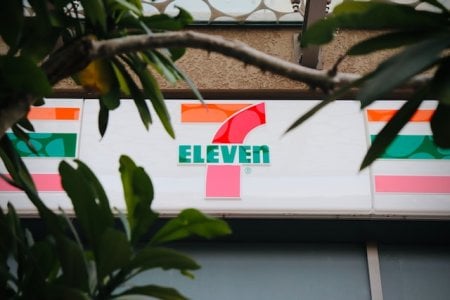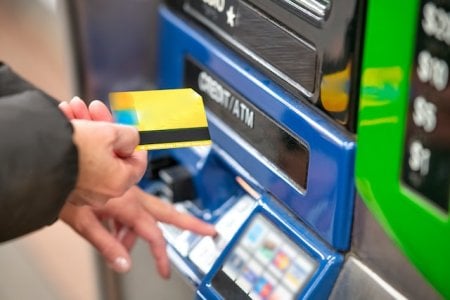7-Eleven's latest decision sparks concern for cash-paying customers
By
Seia Ibanez
- Replies 22
The convenience of cashless transactions is undeniable, but what happens when the option to use cash starts to disappear?
This is a question many Australians are grappling with as 7-Eleven, one of the country's most popular convenience store chains, confirms it will begin to phase out ATMs from its stores.
This decision is a significant blow to customers who prefer or rely on cash transactions.
The move also sparked concerns about the difficulty of accessing cash machines at 7-Eleven’s 762 stores Down Under.
A spokesperson for 7-Eleven explained the decision as a response to ‘reducing our ATM footprint’.
'As our offer evolves, some ranges and services are removed to provide room for new and high-demand offers,' they said.
'We are reducing our ATM footprint to respond to changing customer needs, although some stores will continue to provide ATM facilities.'
The move towards a cashless society has been gaining momentum in Australia for some time now.
A Reserve Bank report released last month showed that 73 per cent of transactions under $10 in 2022 were done with a card, compared with just over half in 2019.
Armaguard and Prosegur Australia obtained regulatory approval to merge, which gave Linfox Armaguard a 90 per cent share of Australia’s cash-in-transit supermarket.
Linfox Armaguard Group, the nation's biggest banknote delivery company, recently admitted that its business model was under threat due to the declining use of cash despite having a near monopoly.
The company's CEO, Mick Cronin, stated that he couldn't guarantee the company could still deliver cash in three years' time.
'As cash usage declines, the cost of moving cash around becomes more expensive, and the industry needs to develop a long-term and sustainable solution,' Cronin said.
He hinted that future cash delivery would require government intervention, as his company held urgent talks with the Australian Banking Association.
‘Linfox Armaguard is working with Treasury, the RBA, the ABA, major banks and related parties to devise a sustainable industry solution for the ongoing provision of cash in Australia,’ he said.
During the last financial year, 718 automatic teller machines were removed, according to data from the Australian Prudential Regulation Authority (APRA). This occurred as 424 bank branches closed in the year to June.
The number of branches has plunged by over a third, or 37 per cent, since June 2017, but in six years, the number of ATMs has plummeted by 59 per cent.
Australia now has 5,693 ATMs still in existence—less than half the 13,814 level of June 2017. The number of bank branches has fallen to 3,588, down from 5,694.
According to finance expert Sarah Wells, she revealed that Australia has already 'lost' a billion dollars worth of physical cash from circulation.
While this money still exists in digital form, the trend of consumers opting to go cashless has nearly caused notes and coins to become obsolete, according to Wells. You can read more about it here.
 What are your thoughts on this shift towards a cashless society? Have you been affected by the phasing out of ATMs? Share your experiences and thoughts in the comments below.
What are your thoughts on this shift towards a cashless society? Have you been affected by the phasing out of ATMs? Share your experiences and thoughts in the comments below.
This is a question many Australians are grappling with as 7-Eleven, one of the country's most popular convenience store chains, confirms it will begin to phase out ATMs from its stores.
This decision is a significant blow to customers who prefer or rely on cash transactions.
The move also sparked concerns about the difficulty of accessing cash machines at 7-Eleven’s 762 stores Down Under.
A spokesperson for 7-Eleven explained the decision as a response to ‘reducing our ATM footprint’.
'As our offer evolves, some ranges and services are removed to provide room for new and high-demand offers,' they said.
'We are reducing our ATM footprint to respond to changing customer needs, although some stores will continue to provide ATM facilities.'
The move towards a cashless society has been gaining momentum in Australia for some time now.
A Reserve Bank report released last month showed that 73 per cent of transactions under $10 in 2022 were done with a card, compared with just over half in 2019.
Armaguard and Prosegur Australia obtained regulatory approval to merge, which gave Linfox Armaguard a 90 per cent share of Australia’s cash-in-transit supermarket.
Linfox Armaguard Group, the nation's biggest banknote delivery company, recently admitted that its business model was under threat due to the declining use of cash despite having a near monopoly.
The company's CEO, Mick Cronin, stated that he couldn't guarantee the company could still deliver cash in three years' time.
'As cash usage declines, the cost of moving cash around becomes more expensive, and the industry needs to develop a long-term and sustainable solution,' Cronin said.
He hinted that future cash delivery would require government intervention, as his company held urgent talks with the Australian Banking Association.
‘Linfox Armaguard is working with Treasury, the RBA, the ABA, major banks and related parties to devise a sustainable industry solution for the ongoing provision of cash in Australia,’ he said.
During the last financial year, 718 automatic teller machines were removed, according to data from the Australian Prudential Regulation Authority (APRA). This occurred as 424 bank branches closed in the year to June.
The number of branches has plunged by over a third, or 37 per cent, since June 2017, but in six years, the number of ATMs has plummeted by 59 per cent.
Australia now has 5,693 ATMs still in existence—less than half the 13,814 level of June 2017. The number of bank branches has fallen to 3,588, down from 5,694.
According to finance expert Sarah Wells, she revealed that Australia has already 'lost' a billion dollars worth of physical cash from circulation.
While this money still exists in digital form, the trend of consumers opting to go cashless has nearly caused notes and coins to become obsolete, according to Wells. You can read more about it here.
Key Takeaways
- 7-Eleven has confirmed plans to reduce the number of ATMs in their stores across Australia.
- This decision aligns with the country's shift towards becoming more cashless, reflecting changing customer behaviour.
- Linfox Armaguard Group, which dominates the cash-in-transit market, expressed doubts about the viability of cash delivery beyond the next three years.
- APRA data revealed a decline in the number of ATMs and bank branches, signifying a significant drop in the physical banking infrastructure.









